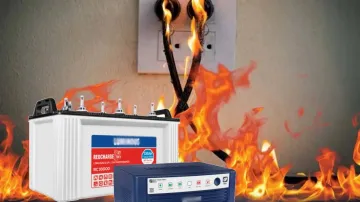Four members of a family in Delhi tragically died due to a fire caused by an inverter battery. Similar incidents of fire in AC units have also been reported in Delhi-NCR recently. Most electronic device fires occur due to lack of maintenance and overloading. This specific inverter battery fire is also believed to be caused by these factors. Reportedly, there was an explosion in the inverter and its battery around 3 am, leading to a house fire.
To prevent such incidents, it's crucial to take care of the following:
Battery maintenance: Regularly check the water levels in the inverter battery. It should be done every 45 days, and only distilled water should be used to top it up.
Wiring: Inspect the wiring of the inverter regularly to avoid any short circuits. Opt for high-quality wiring to reduce the risk of loose connections and fires. Additionally, be mindful of the load applied to the inverter, and use it according to the capacity of the appliances being powered.
Ventilation: Ensure that the inverter has proper ventilation to prevent overheating, similar to the needs of a fridge or AC unit. Additionally, maintain a suitable amount of space between the inverter and its battery to allow for proper airflow.
Meanwhile, air conditioning (AC) fires can occur due to various reasons, such as poor maintenance, lack of cleaning, or electrical short circuits. Warning signs of potential AC issues often manifest in advance. Unfortunately, many people tend to overlook these signs, which could lead to substantial losses. If you have an AC at home, it's crucial not to ignore the following five warning signs. Ignoring these signs could lead to a fire or explosion risk associated with your AC.
These are the five warning signs to watch for:
- Unusual sounds coming from the AC could indicate a problem.
- Intermittent airflow while the AC is running may signify an issue.
- Fluctuations in the cooling performance of your AC could point to compressor or other internal component issues.
- If the body of the AC becomes noticeably hotter than usual after continuous operation, it may indicate insufficient ventilation for the hot air being expelled.
- Malfunctioning AC modes on the remote, such as the cool mode, dry mode, fan mode, or energy-saving mode, could indicate a malfunctioning sensor within the AC.
ALSO READ: Airtel 5G download speed increased compared to Jio: Here's difference between their 5G networks
